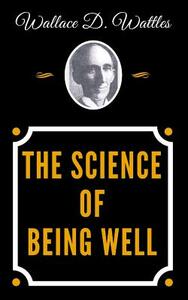You need to sign in or sign up before continuing.
Take a photo of a barcode or cover
"You are not mentally developed by what you read, but by what you think about what you read. "
I can pretty much copy and paste my review of his other hilarious book “the science of getting rich” : Mumbo jumbo defined. Mostly bullshit mixed with the gift of wording obvious things as if it was insight (like if you said “heavy stuff has weight”) mixed with pompous and cult-style assurances that the false logic is iron clad.
Here is a quote to grasp where he comes from (never with any real defense or attempt to prove it. ) he says “everything in the universe wants you to be well you have absolutely nothing to overcome but your own habit of thinking in a certain way about desease”
Take this shit to the cancer ward and see how many people get helped.
Here is a quote to grasp where he comes from (never with any real defense or attempt to prove it. ) he says “everything in the universe wants you to be well you have absolutely nothing to overcome but your own habit of thinking in a certain way about desease”
Take this shit to the cancer ward and see how many people get helped.
"You are not mentally developed by what you read, but by what you think about what you read. "
Interesting, but his writing voice is very pretensious.
The Gwyneth Paltrow of the early twentieth century. Once again there’s some universal wisdom here: be thankful, eat when you’re hungry, etc., but it’s built upon a foundation of absolute, unscientific nonsense.
dull as hell, 150 pages of rambling
It's not based on science at all, it's all in believing you're well, you're a substance, and being thankful to God, that's all. I mean the author just says the same things over and over. I found some of his 'advice' even dangerous, he says you shouldn't even eat or drink if you're not hungry or thirsty... Also, he says you don't even need to go to the doctor as you can heal yourself with positive thoughts, and not thinking about being ill at all.... um, what? Like, I get that positive thinking can help, but that is extreme... He presents no facts whatsoever while repetitively claiming it's the science of wellbeing.... yikes. I don't recommend this, the e advice it gives can be all on a short list, and aren't that helpful anyways. The only good parts were, about sleep, deep breaths and that's it, and I already knew that already...
It's not based on science at all, it's all in believing you're well, you're a substance, and being thankful to God, that's all. I mean the author just says the same things over and over. I found some of his 'advice' even dangerous, he says you shouldn't even eat or drink if you're not hungry or thirsty... Also, he says you don't even need to go to the doctor as you can heal yourself with positive thoughts, and not thinking about being ill at all.... um, what? Like, I get that positive thinking can help, but that is extreme... He presents no facts whatsoever while repetitively claiming it's the science of wellbeing.... yikes. I don't recommend this, the e advice it gives can be all on a short list, and aren't that helpful anyways. The only good parts were, about sleep, deep breaths and that's it, and I already knew that already...
We have forgotten so much. This book was published in the 30s and is full of wisdom that we are just now rediscovering (like whole foods and intermittent fasting).
I don't know what I was expecting as I decided to read this book but I definetly didn't like it as much as I thought.
Since the title is The "Science" of Being "Well", one would think that this would be a medical book. However, the author clearly states : "Do not read "Doctor Books" or medical literature, or the literature of those whose theories conflict with those herein set forth... ". After that, he goes on to say : "the science of being well is an exact science.". I didn't know how to react to this but it did make me very mad.
At first, it seemed to me that the author wrote a very long introduction until I realized that it was only a first part in which he talked about the idea of just think healthy and you shall be.
I don't completly disagree with such statements but I feel like he gave them more than needed importance.
He also mentions that we don't need to know about some medical fields such as anatomy and physiology in order to be healthy. I had to roll my eyes at that part. The fact that we haven't yet discovered many unknown things doesn't make our currently knowledge irrelevant.
The book claimed to be a scientific one yet gave religious arguments and exemples. I have no problem with religion whatsoever, but I completly reject using it for scientific purposes no matter what. Consequently, such parts were a turn down.
Other of his statements I didn't like :
"If you are to get well and stay well, you must drop the idea of doing things because they are good for your health, and do things because you want to do them."
"thinking health and doing health, you will certainly be well".
Although I disagreed with many illogical and absurd things he mentioned in the second half (ex: what you desire >>> what's good for you), I did enjoy this part more than the first one. This says it all.
Still, I liked his body + mind + spiritual idea. That way, he separated the mental issues from faith being very different things as mentioned in several exemples.
Even though he gave too much importance to the involuntary aspect, he mentioned the voluntary feature as a non similar one. I found this part good too.
Another "not bad" idea was the principle of health with the thinking and acting. It did seem true and logical at times, but it felt like the acting instructions he suggested were not enough at all. Therefore, one cannot apply them now and expect the required results.
All in all, I only find few paragraphs interesting and worth reading. Other than that, it isn't a pleasant book.
But then, I have to remind myself that it was written in 1910.
Since the title is The "Science" of Being "Well", one would think that this would be a medical book. However, the author clearly states : "Do not read "Doctor Books" or medical literature, or the literature of those whose theories conflict with those herein set forth... ". After that, he goes on to say : "the science of being well is an exact science.". I didn't know how to react to this but it did make me very mad.
At first, it seemed to me that the author wrote a very long introduction until I realized that it was only a first part in which he talked about the idea of just think healthy and you shall be.
I don't completly disagree with such statements but I feel like he gave them more than needed importance.
He also mentions that we don't need to know about some medical fields such as anatomy and physiology in order to be healthy. I had to roll my eyes at that part. The fact that we haven't yet discovered many unknown things doesn't make our currently knowledge irrelevant.
The book claimed to be a scientific one yet gave religious arguments and exemples. I have no problem with religion whatsoever, but I completly reject using it for scientific purposes no matter what. Consequently, such parts were a turn down.
Other of his statements I didn't like :
"If you are to get well and stay well, you must drop the idea of doing things because they are good for your health, and do things because you want to do them."
"thinking health and doing health, you will certainly be well".
Although I disagreed with many illogical and absurd things he mentioned in the second half (ex: what you desire >>> what's good for you), I did enjoy this part more than the first one. This says it all.
Still, I liked his body + mind + spiritual idea. That way, he separated the mental issues from faith being very different things as mentioned in several exemples.
Even though he gave too much importance to the involuntary aspect, he mentioned the voluntary feature as a non similar one. I found this part good too.
Another "not bad" idea was the principle of health with the thinking and acting. It did seem true and logical at times, but it felt like the acting instructions he suggested were not enough at all. Therefore, one cannot apply them now and expect the required results.
All in all, I only find few paragraphs interesting and worth reading. Other than that, it isn't a pleasant book.
But then, I have to remind myself that it was written in 1910.
I don't know what I was expecting as I decided to read this book but I definetly didn't like it as much as I thought.
Since the title is The "Science" of Being "Well", one would think that this would be a medical book. However, the author clearly states : "Do not read "Doctor Books" or medical literature, or the literature of those whose theories conflict with those herein set forth... ". After that, he goes on to say : "the science of being well is an exact science.". I didn't know how to react to this but it did make me very mad.
At first, it seemed to me that the author wrote a very long introduction until I realized that it was only a first part in which he talked about the idea of just think healthy and you shall be.
I don't completly disagree with such statements but I feel like he gave them more than needed importance.
He also mentions that we don't need to know about some medical fields such as anatomy and physiology in order to be healthy. I had to roll my eyes at that part. The fact that we haven't yet discovered many unknown things doesn't make our currently knowledge irrelevant.
The book claimed to be a scientific one yet gave religious arguments and exemples. I have no problem with religion whatsoever, but I completly reject using it for scientific purposes no matter what. Consequently, such parts were a turn down.
Other of his statements I didn't like :
"If you are to get well and stay well, you must drop the idea of doing things because they are good for your health, and do things because you want to do them."
"thinking health and doing health, you will certainly be well".
Although I disagreed with many illogical and absurd things he mentioned in the second half (ex: what you desire >>> what's good for you), I did enjoy this part more than the first one. This says it all.
Still, I liked his body + mind + spiritual idea. That way, he separated the mental issues from faith being very different things as mentioned in several exemples.
Even though he gave too much importance to the involuntary aspect, he mentioned the voluntary feature as a non similar one. I found this part good too.
Another "not bad" idea was the principle of health with the thinking and acting. It did seem true and logical at times, but it felt like the acting instructions he suggested were not enough at all. Therefore, one cannot apply them now and expect the required results.
All in all, I only find few paragraphs interesting and worth reading. Other than that, it isn't a pleasant book.
But then, I have to remind myself that it was written in 1910.
Since the title is The "Science" of Being "Well", one would think that this would be a medical book. However, the author clearly states : "Do not read "Doctor Books" or medical literature, or the literature of those whose theories conflict with those herein set forth... ". After that, he goes on to say : "the science of being well is an exact science.". I didn't know how to react to this but it did make me very mad.
At first, it seemed to me that the author wrote a very long introduction until I realized that it was only a first part in which he talked about the idea of just think healthy and you shall be.
I don't completly disagree with such statements but I feel like he gave them more than needed importance.
He also mentions that we don't need to know about some medical fields such as anatomy and physiology in order to be healthy. I had to roll my eyes at that part. The fact that we haven't yet discovered many unknown things doesn't make our currently knowledge irrelevant.
The book claimed to be a scientific one yet gave religious arguments and exemples. I have no problem with religion whatsoever, but I completly reject using it for scientific purposes no matter what. Consequently, such parts were a turn down.
Other of his statements I didn't like :
"If you are to get well and stay well, you must drop the idea of doing things because they are good for your health, and do things because you want to do them."
"thinking health and doing health, you will certainly be well".
Although I disagreed with many illogical and absurd things he mentioned in the second half (ex: what you desire >>> what's good for you), I did enjoy this part more than the first one. This says it all.
Still, I liked his body + mind + spiritual idea. That way, he separated the mental issues from faith being very different things as mentioned in several exemples.
Even though he gave too much importance to the involuntary aspect, he mentioned the voluntary feature as a non similar one. I found this part good too.
Another "not bad" idea was the principle of health with the thinking and acting. It did seem true and logical at times, but it felt like the acting instructions he suggested were not enough at all. Therefore, one cannot apply them now and expect the required results.
All in all, I only find few paragraphs interesting and worth reading. Other than that, it isn't a pleasant book.
But then, I have to remind myself that it was written in 1910.





